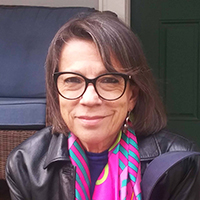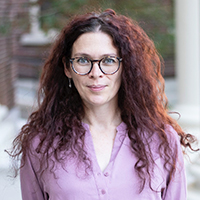By Daniela Calvetti and Annalisa Quaini
People tend to feel more welcome and comfortable in settings with individuals who resemble them in some capacity, including (but not limited to) shared gender, race, and/or ethnicity. Scientific events are no different, in that acknowledging diversity as an asset rather than a liability—and working to broaden representation accordingly—may draw a more diverse pool of attendees. These ideas inspired Daniela Calvetti of Case Western Reserve University, Annalisa Quaini of the University of Houston, and Gianluigi Rozza of the International School for Advanced Studies (SISSA) to organize a workshop titled “Power of Diversity in Uncertainty Quantification” (PoD UQ) — a satellite event of the 2024 SIAM Conference on Uncertainty Quantification (UQ24), which was held in late February in Trieste, Italy.
Due to the COVID-19 pandemic, many younger researchers have had limited opportunities to meet, socialize, and network at in-person conferences. Furthermore, sociological studies have indicated that the lack of social interaction in recent years has particularly impacted women and members of marginalized groups. PoD UQ was thus envisioned as a forum to build a diverse community around the field of UQ: an area of study that requires the integration of mathematics, statistics, theory, and computation. In other words, UQ is a field for which diversity is already an asset.
PoD UQ took place on February 26th at SISSA, which is located in the beautiful hills of Trieste, and attracted 85 participants. The workshop sought to provide a welcoming introduction to UQ for younger researchers—especially women and individuals from minoritized groups—and offer them the chance to network with both each other and more established researchers. The high-quality program featured three overview talks that each touched on a different aspect of UQ, as well as two spotlight presentations on specific topics of interest. The following internationally renowned researchers delivered the overview talks on notable subjects in UQ and fielded insightful questions from the audience:
- Amy Braverman of NASA’s Jet Propulsion Laboratory: “Statistics in Uncertainty Quantification and Uncertainty Quantification in Statistics”
- Noemi Petra of the University of California, Merced: “Inverse Problems: Integrating Data with PDE-based Models Under Uncertainty”
- Ralph Smith of North Carolina State University: “Roles of Sensitivity Analysis and Uncertainty Quantification for Science and Engineering Models.”
The two spotlight presentations were equally informative and stimulating:
- Emily Kang of the University of Cincinnati: “Spatial Statistics and Uncertainty Quantification in Remote Sensing and Climate Science”
- Maria Strazzullo of Politecnico di Torino: “Optimization Problems Governed by PDEs Under the Influence of Random Variables.”
In addition to the individual talks, a panel discussion titled “Walking the Tightrope of UQ: Opportunity and Liabilities of Interdisciplinary Research” invoked an interactive conversation. Panelists Jenny Brynjarsdottir of Case Western Reserve University, Masoumeh Dashti of the University of Sussex, Juan Restrepo of Oak Ridge National Laboratory, and Gianluigi Rozza of SISSA commented on their experiences and fielded thoughtful questions from the audience. In fact, a post-workshop survey indicated that many participants would have appreciated even more time for the panel.
The daylong PoD UQ workshop included two coffee breaks, a long lunch break, and dinner at a historic restaurant overlooking the Gulf of Trieste. As organizers, we wanted to offer plenty of opportunities for the participants—many of whom belonged to minoritized groups—to meet and get to know other researchers at various career stages in order to build their networks and initiate lasting relationships. To encourage personal interactions across different levels of seniority, younger researchers practiced their “elevator pitches” (i.e., short descriptions of their work) with more established scientists during the lunch break. And in the late afternoon, roughly 30 percent of the junior participants presented their work at a well-attended poster session. The three winners of the poster competition—Nicole Aretz of the University of Texas at Austin, Bianca Champenois of the Massachusetts Institute of Technology, and Sonia Foschiatti of the University of Trieste—received generous gift cards to purchase SIAM books.
During dinner, we delivered a speech titled “Breaking Barriers: Navigating the Challenges Faced by Minority Individuals in STEM” to facilitate discussions at each table. The speech reminded everyone that despite significant progress in recent decades, the road to real inclusivity is still long; it also invited younger researchers to play their part in shaping a welcoming scientific community.
PoD UQ was a fully immersive day in preparation for UQ24, during which graduate students, postdoctoral fellows, invited speakers, and SIAM officers enjoyed high-level presentations and shared ideas. The results of an anonymous survey for Pod UQ participants suggested that the attendees greatly appreciated the scientific quality of the presentations and the welcoming atmosphere. Many attendees also expressed the desire for similar events in the future and appreciated the encouragement to take an active role in breaking barriers.
The presentation slides from PoD UQ are available on the PoD UQ webpage.
Acknowledgments: PoQ UQ was partially supported by SISSA and the U.S. National Science Foundation. It was endorsed by the Association for Women in Mathematics and the Society for Advancement of Chicanos/Hispanics and Native Americans in Science.

|
Daniela Calvetti is the James Wood Williamson Professor in the Department of Mathematics, Applied Mathematics, and Statistics at Case Western Reserve University. Her research interests include computational inverse problems, Bayesian inference, and large-scale computing.
|

|
Annalisa Quaini is a professor of mathematics at the University of Houston. Her research interests include computational fluid dynamics and fluid-structure interaction with applications in medicine, biomedical engineering, and atmospheric science.
|